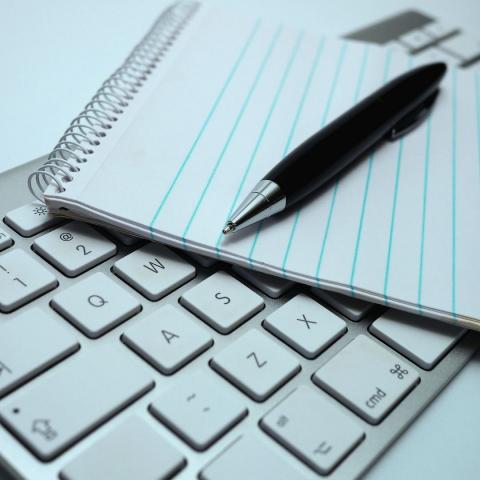
Some of us are diehard longhand writers, while others are adamant about composing on screen. Many more are in the middle, creating multiple drafts on paper before ever opening a blank word processing document, or typing out dozens of pages to print and mark up by hand. Still others use writing apps with built-in editing capabilities.
Whether you fill notebooks and journals to their brim or have hundreds of .docx files on your desktop, you have your method. If it’s working for you, great. If not, or if you feel generally disorganized or unmotivated in your writing life, it might be time to rethink your process.
Having a plan for how to compose is a great start. There is no right or wrong method of composition, but to help you decide which one works best for you, here are three considerations—plus some insight from the greats:
Which is faster for you?
Some of us can type faster than we can think, and probably choose to compose on screen. Some of us hunt and peck on the keyboard but feel perfectly comfortable with a pen in hand.
"I don’t write exclusively by hand but I think I feel freer when I write by hand. In fact, I know I do. I write at odd times. I have a notebook by the bed. A lot of things will come to me, which I’ll note down longhand. When you’re writing a book, there are the hours at a desk, then there are all the other times that the book is still alive.” -Jhumpa Lahiri
Whichever method you choose should answer this basic question: what will get me to the actual writing faster? If you have to boot up an ancient computer before you can start writing, reach for a notebook. If you can’t find a pen but the computer is on, type first (but make a sticky note about buying pens!).
Of course, length is a consideration: Poems and short stories can be more easily written out on paper and typed up later. If your writing project is longer, like a novel or long-form essay, typing is going to be easier on the hands—for most of us, anyway:
John Steinbeck reportedly went through 60 pencils to draft The Grapes of Wrath in longhand.
And let’s consider distraction as a deterrent to speed, too. If you can’t open your laptop to write without checking social media first, then longhand composition is definitely going to be faster for you. If a handwritten page full of scratched-out words makes your brain hurt, then a clean screen is more likely to keep you plowing ahead.
Which is more intuitive for you?
Again I say, some of us can type faster than we can think, which can lead to free or automatic writing if you can tap into that creative flow and not think so much about where it’s going. Even if you write for 20 minutes and don’t hit a stride until 15 minutes in, it’s quick and easy to scroll up and delete the drivel. Automatic writing is an excellent tool for overcoming blocks, and many of us prefer a keyboard for such exercises. On the other hand, if you are used to daily journaling with a pen, automatic writing with a pen might be more natural and productive for you.
"Whatever it is that happens between the brain and the pencil in my hand, that’s really important to my process.” -Author Judy Blume, from a 2009 interview with C-SPAN
There is also the visceral sensation to consider—because we’re making art, after all, so the process itself should be comfortable and stimulating. Do you like the sound of keys better than the feel of a pen? Does one process or the other make you feel more awake, engaged, and inspired? In a 2014 article, The Guardian quoted Edouard Gentaz, a professor of psychology at the University of Geneva, with the assertion that, “Handwriting is a complex task which requires various skills—feeling the pen and paper, moving the writing implement, and directing movement by thought.” In other words, cognitively speaking, there is a lot more going on when we write than when we type.
Furthermore, the article points out that word processing, while faster, is somewhat limiting in terms of format; “…you cannot invent a form not foreseen by the software.” Does that limit your creativity? Or maybe you get the words down first and conceive of a form and structure later, during revision?
“…handwriting forces you to do a second draft, rather than just tidying up and deleting bits on a computer.” –Neil Gaiman
Which is easier for you to begin to approach revising?
If you are a writer who keeps every draft of your work, it might be easier for you to compose on paper and simply flip to a clean sheet. Digital drafts must be renamed every time you want to save one, and even then, it can be harder to track them. If you are organizing a lot of completed drafts into a manuscript, hard copies are often the way to go. Whether handwritten or typed, you can three-hole punch your copies and move them around at will within a binder. In Microsoft Word, you could use the Track Changes feature to view and save all changes you make to a given document; but once you click “Accept all changes,” the history of your revisions will be erased and you’ll be left with the latest version.
"I like the slowness of writing by hand. Then I type it up and scrawl all over that. And keep on retyping it, each time making corrections both by hand and directly on the typewriter, until I don’t see how to make it any better.” –Susan Sontag
Finally, is sharing your work with others part of your revision process? If so, digital drafts are much faster and easier to share; simply copy and paste into a chat box, upload to Google Drive, or attach to an email and send it off. Of course, if you have access to a scanner, you can also scan hard copies and email them—as long as whoever you’re sending them to can read your handwriting!
So, paper and ink, screen and keys, or a combination of both? What does your process look like, and do you plan on switching it up a bit to see if something else might work better for you? Share with us in the comments.
Related reading: Why we call it a writing practice
How expressive writing can keep you afloat
Want to receive tips and inspiration like this in your inbox every Sunday morning? Join our email list community! You will receive weekly advice, a year’s worth of weekly writing prompts as a FREE download, and be eligible to participate in our monthly photo prompt contest for a chance to share an original piece of writing with our community of more than 1,500 subscribers.
